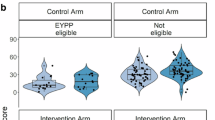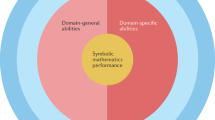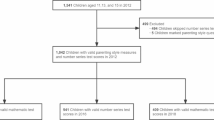Abstract
Background:
Extremely preterm (EP, <26 wk gestation) children have been observed to have poor academic achievement in comparison to their term-born peers, especially in mathematics. This study investigated potential underlying causes of this difficulty.
Methods:
A total of 219 EP participants were compared with 153 term-born control children at 11 y of age. All children were assessed by a psychologist on a battery of standardized cognitive tests and a number estimation test assessing children’s numerical representations.
Results:
EP children underperformed in all tests in comparison with the term controls (the majority of Ps < 0.001). Different underlying relationships between performance on the number estimation test and mathematical achievement were found in EP as compared with control children. That is, even after controlling for cognitive ability, a relationship between number representations and mathematical performance persisted for EP children only (EP: r = 0.346, n = 186, P < 0.001; control: r = 0.095, n = 146, P = 0.256).
Conclusion:
Interventions for EP children may target improving children’s numerical representations in order to subsequently remediate their mathematical skills.
Similar content being viewed by others
Log in or create a free account to read this content
Gain free access to this article, as well as selected content from this journal and more on nature.com
or
References
Field DJ, Dorling JS, Manktelow BN, Draper ES . Survival of extremely premature babies in a geographically defined population: prospective cohort study of 1994-9 compared with 2000-5. BMJ 2008;336:1221–3.
Johnson S, Fawke J, Hennessy E, et al. Neuro-developmental disability through 11 years of age in children born before 26 weeks of gestation. Pediatrics 2009; 124:e249–57.
Johnson S, Hennessy E, Smith R, Trikic R, Wolke D, Marlow N . Academic attainment and special educational needs in extremely preterm children at 11 years of age: the EPICure study. Arch Dis Child Fetal Neonatal Ed 2009;94:F283–9.
Anderson PJ, De Luca CR, Hutchinson E, Spencer-Smith MM, Roberts G, Doyle LW; Victorian Infant Collaborative Study Group. Attention problems in a representative sample of extremely preterm/extremely low birth weight children. Dev Neuropsychol 2011;36:57–73.
Mulder H, Pitchford NJ, Hagger MS, Marlow N . Development of executive function and attention in preterm children: a systematic review. Dev Neuropsychol 2009;34:393–421.
Marlow N, Hennessy EM, Bracewell MA, Wolke D . Motor and executive function at 6 years of age after extremely preterm birth. Pediatrics 2007;120:793–804.
Luciana M, Lindeke L, Georgieff M, Mills M, Nelson CA . Neurobehavioral evidence for working-memory deficits in school-aged children with histories of prematurity. Dev Med Child Neurol 1999;41:521–33.
Rose SA, Feldman JF . Memory and processing speed in preterm children at eleven years: a comparison with full-terms. Child Dev 1996;67:2005–21.
Johnson S, Wolke D, Hennessy E, Marlow N . Educational outcomes in extremely preterm children: neuropsychological correlates and predictors of attainment. Dev Neuropsychol 2011;36:74–95.
Taylor HG, Klein N, Anselmo MG, Minich N, Espy KA, Hack M . Learning problems in kindergarten students with extremely preterm birth. Arch Pediatr Adolesc Med 2011;165:819–25.
Woodward LJ, Moor S, Hood KM, et al. Very preterm children show impairments across multiple neurodevelopmental domains by age 4 years. Arch Dis Child Fetal Neonatal Ed 2009;94:F339–44.
Hornby G, Woodward LJ . Educational needs of school-aged children born very and extremely preterm: a review. Educ Psychol Rev 2009; 21:247–66.
Wolke D, Meyer R . Cognitive status, language attainment, and prereading skills of 6-year-old very preterm children and their peers: the Bavarian Longitudinal Study. Dev Med Child Neurol 1999;41:94–109.
Johnson S, Marlow N, Wolke D . Assessing educational outcomes in middle childhood: validation of the Teacher Academic Attainment Scale. Dev Med Child Neurol 2012;54:544–51.
Taylor G, Espy KA, Anderson PJ . Mathematics deficiencies in children with very Low Birth Weight or Very Preterm Birth. Dev Disabil Res Rev 2009;15:52–9.
Anderson P, Doyle LW; Victorian Infant Collaborative Study Group. Neurobehavioral outcomes of school-age children born extremely low birth weight or very preterm in the 1990s. JAMA 2003;289:3264–72.
Wocadlo C, Rieger I . Phonology, rapid naming and academic achievement in very preterm children at eight years of age. Early Hum Dev 2007;83:367–77.
Geary DC, Hoard MK, Byrd-Craven J, Nugent L, Numtee C . Cognitive mechanisms underlying achievement deficits in children with mathematical learning disability. Child Dev 2007;78:1343–59.
Mazzocco MM, Singh Bhatia N, Lesniak-Karpiak K . Visuospatial skills and their association with math performance in girls with fragile X or Turner syndrome. Child Neuropsychol 2006;12:87–110.
Bull R, Espy KA, Wiebe SA . Short-term memory, working memory, and executive functioning in preschoolers: longitudinal predictors of mathematical achievement at age 7 years. Dev Neuropsychol 2008;33:205–28.
LeFevre JA, Fast L, Skwarchuk SL, et al. Pathways to mathematics: longitudinal predictors of performance. Child Dev 2010;81:1753–67.
Geary DC . Mathematical disabilities: cognitive, neuropsychological, and genetic components. Psychol Bull 1993;114:345–62.
Torbeyns J, Verschaffel L, Ghesquière P . Strategy development in children with mathematical disabilities: insights from the choice/no-choice method and the chronological-age/ ability-level-match design. J Learn Disabil 2004;37:119–31.
Geary DC, Brown SC . Cognitive addition: Strategy choice and speed-of-processing differences in gifted, normal, and mathematically disabled children. Dev Psychol 1991;27:398-406.
De Smedt B, Verschaffel L, Ghesquière P . The predictive value of numerical magnitude comparison for individual differences in mathematics achievement. J Exp Child Psychol 2009;103:469–79.
Jaekel J, Wolke D, Bartmann P . Poor attention rather than hyperactivity/impulsivity predicts academic achievement in very preterm and full-term adolescents. Psychol Med 2012; e-pub ahead of print 21 May 2012.
Gilmore CK, McCarthy SE, Spelke ES . Non-symbolic arithmetic abilities and mathematics achievement in the first year of formal schooling. Cognition 2010;115:394–406.
Just MA, Varma S . The organization of thinking: what functional brain imaging reveals about the neuroarchitecture of complex cognition. Cogn Affect Behav Neurosci 2007;7:153–91.
Isaacs EB, Edmonds CJ, Lucas A, Gadian DG . Calculation difficulties in children of very low birthweight: a neural correlate. Brain 2001;124(Pt 9):1701–7.
Paterson SJ, Girelli L, Butterworth B, Karmiloff-Smith A . Are numerical impairments syndrome specific? Evidence from Williams syndrome and Down’s syndrome. J Child Psychol Psychiatry 2006; 47:190–204.
De Smedt B, Swillen A, Devriendt K, Fryns JP, Verschaffel L, Ghesquière P . Mathematical disabilities in children with velo-cardio-facial syndrome. Neuropsychologia 2007;45:885–95.
Ramani GB, Siegler RS . Reducing the gap in numerical knowledge between low- and middle-income preschoolers. J Applied Dev Psychol 2011;32:146–159.
Wood NS, Costeloe K, Gibson AT, Hennessy EM, Marlow N, Wilkinson AR . The EPICure study: associations and antecedents of neurological and developmental disability at 30 months of age following extremely preterm birth. Arch Dis Child Fetal Neonatal Ed 2005;90:F134–40.
Marlow N, Wolke D, Bracewell M, Samara M . Neurologic and developmental disability at 6 years of age following extremely preterm birth. New Engl J Med 2005;352:9–19.
Kaufman, AS, Kaufman, NL . Kaufman-ABC, 2nd edn. Circle Pines, MN: American Guidance Service, 2004.
Weschler D. Weschler Individual Achievement Test. 2nd edn. Oxford, UK: Pearson Assessment/PsychCorp, 2005.
Wolke D, Schulz J, Meyer R . Entwicklungslangzeitfolgen bei ehemaligen, sehr unreifen Fruehgeborenen [long term developmental outcome of ex very preterm born children]. Monatsschrift fuer Kinderheilkunde 2001;149:S53–61.
Korkman M, Kirk U, Kemp S . NEPSY: A developmental neuropsychological assessment. San Antonio, TX: The Psychological Corporation, 1998.
Cohen J. Statistical Power Analysis for the Behavioral Sciences. 2nd edn. Hillsdale, NJ: Lawrence Erlbaum Associates, 1988:25.
Acknowledgements
Summary data used in this paper have been published previously (3,9,14), but the analysis presented here takes a different approach to the data in order to more fully understand the specific difficulty that very preterm children have with mathematics, and to tease out factors that may contribute to the observed problems in mathematical processing for this group.
Author information
Authors and Affiliations
Corresponding author
Rights and permissions
About this article
Cite this article
Simms, V., Gilmore, C., Cragg, L. et al. Mathematics difficulties in extremely preterm children: evidence of a specific deficit in basic mathematics processing. Pediatr Res 73, 236–244 (2013). https://doi.org/10.1038/pr.2012.157
Received:
Accepted:
Published:
Issue date:
DOI: https://doi.org/10.1038/pr.2012.157
This article is cited by
-
Langzeitüberlebensqualität ehemaliger kleiner Frühgeborener
Monatsschrift Kinderheilkunde (2016)
-
Nature and origins of mathematics difficulties in very preterm children: a different etiology than developmental dyscalculia
Pediatric Research (2015)



